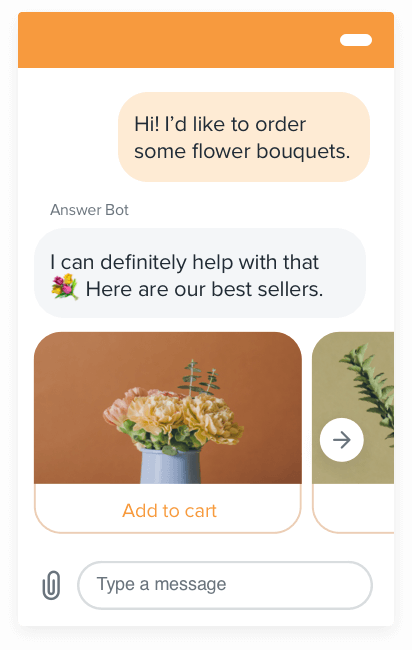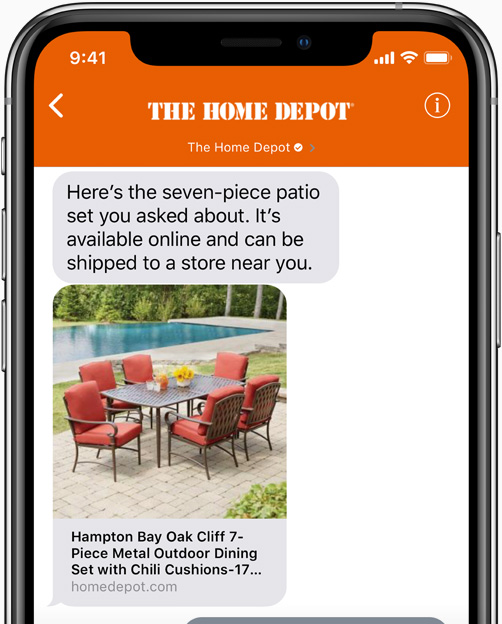Instant messaging platforms
Customers use instant messaging everywhere else. Meet them where they are.
Instant messaging tools for business
Senast uppdaterad July 22, 2024
According to Forrester, customers who chat with a company convert 2.8 times more often than those who don’t. And those same customers also tend to buy more; their average cart value is 10 to 15 percent higher than other customers.
These stats are a direct reflection of an instant messaging tool’s ability to help your team have more meaningful customer interactions. Agents can have real-time or ongoing conversations on any messaging channel with the full conversation history, while customers go about their day, checking in whenever their device is pinged with a new message.
At the same time, customer experience managers and admins can customize workflows around business messaging so their teams deliver the best, personalized, and efficient experience possible. From top to bottom, business instant messaging software makes service operations more effective.
That leaves you the task of finding the best platform for your business. Easier said than done. Fortunately, on this page, you’ll find everything you need to know—from the basics of instant messaging to our ranked list of the best messaging platforms for business.
Table of contents
- How does instant messaging help companies?
- Five best instant messaging platforms
- Instant messaging use cases
- Messaging features
- Messaging benefits
How does instant messaging software help businesses?
Instant messaging software helps businesses by:
- Enabling them to communicate with customers and prospects on their preferred messaging channel or app.
- Allowing agents to be more efficient with the help of bots, canned responses, and other workflow automation.
- Facilitating self-service with AI that surfaces and knowledge base articles.
- Reducing service bottlenecks by enabling agents to have multiple, simultaneous, real-time conversations in a unified workspace.
5 best instant messaging platforms for business
Software | Starting price(/user/month) | Free trial/plan | Key Features |
|---|---|---|---|
Zendesk |
$49 |
Free trial |
|
Instagram Direct |
N/A |
N/A |
|
|
|
Free* |
N/A |
|
Facebook Messenger |
Free |
N/A |
|
Apple Messages for Business |
Free |
N/A |
|
*First 1000 conversations are free in WhatsApp then $0.0088 to $0.0147 per message. More info.
Zendesk

With Zendesk, your team can engage in more meaningful conversations with customers. Agents have access to the full conversation history, easy automation, and AI-enabled chatbots to make their jobs easier.,
Guide customers through productive conversations
Your agents can do it all, but that doesn’t mean they should. With Zendesk’s Answer Bot, you can provide 24/7 support for customers with quick replies to common questions and knowledge base links for more complex issues. And if neither of those options work, Answer Bot can collect the customer’s information so agents can jump right into the problem when they’re online.
Your support team can also build custom conversational flows to drive conversations to a resolution with Flow Builder, a click-to-configure tool for building engaging conversational experiences without writing a single line of code.
Build however you want
Zendesk is an open and flexible conversational CRM platform that can be customized to your heart’s content – or to meet your business goals. With myriad out-of-the-box channels (like messaging), reporting tools, and automation, it’s a leading solution for businesses large and small who are curious about messaging. For companies with sophisticated taste, there also are numerous apps, integrations, and customizations available
Pricing
- Suite Team: $49 per agent, per month
- Suite Growth: $79 per agent, per month
- Suite Professional: $99 per agent, per month
Free trial: 14 days
Features
- Automation and AI in Answer Bot
- Conversational CRM
- Customizable chat routing
- Canned responses
- Reporting
- Branding customization
- Native knowledge base,
- App and integration marketplace
- Developer platform for complex use cases
- Full conversation history
- AI-enabled conversational shortcuts
- Unified agent workspace
- Chat flow builder
Instagram Direct

Doing business messaging right is all about connecting with your customers where they are. And for many businesses, their customers are on Instagram and will be for some time as they age into their prime spending years. In fact, according to Statista, “More than half of the global Instagram population worldwide is aged 34 years or younger.”
With Instagram Direct, you can enable customers to contact you with direct messages through your IG profile, via your stories, posts, and Instagram shop. You can also funnel customers to your DMs by adding an IG.me link on your emails and website.With a professional Instagram account, you’ll gain more sophisticated messaging features too, like saved replies, thread management, and FAQs.
And since Instagram is part of the Meta ecosystem, you can integrate Instagram DMs seamlessly with your Facebook Messenger Inbox and WhatsApp account. If you want to take integration to the next level, you can also use Instagram Direct’s API to build tight connections between IG messages and your CRM. Or use the Instagramer Suite app to connect IG to your Zendesk Dashboard where you can receive a reply to DMs, connect multiple IG accounts, and prioritize message requests.
Pricing not available
Free trial not available
Features
- IG.me link for your website and emails
- Thread management
- FAQs and saved replies
- Message reactions
- Messenger API for Instagram
- Text, Images, Video, Files, GIFs, Emoji
Learn more about Zendesk for Instagram
WhatsApp for Business

Given that WhatsApp has the most users in the world, if you’re a global business (or you have global aspirations), WhatsApp for Business is a must-have. From 2020 to 2021 alone, customer support tickets submitted via WhatsApp increased by 370 percent.
And if the broad base of users isn’t enough, WhatsApp for Business provides plenty of intuitive tools for creating engaging and convenient customer experiences. And if you have fewer than 1000 conversations per month, you’ll pay nothing, which makes WhatsApp a great free live chat software option for smaller operations.
Business owners can use the WhatsApp Business App to create mobile storefronts, or catalogs, complete with product/service images, prices, and website links. Businesses can be verified by WhatsApp as well which offers a layer of trust that SMS messages can’t replicate. Businessescan also use WhatsApp's message template and multimedia messages for a more personalized, on-brand experience.
It is worth noting, though, that there’s a big difference between the WhatsApp for Business app and the API. The app is great for small businesses but not for larger teams since only one user can use the WhatsApp business profile and respond to messages.
The API doesn’t have this limitation; it’s designed for multi-person support teams and can scale even with a large operation, integrating fully into the Zendesk Suite.
Pricing: Conversation-based pricing, with first the 1000 conversations free
Free trial: Not available
Features
- Mobile storefront with up to 500 products
- Business profile verification
- Message templates
- Multimedia and interactive messages
- API
- Chatbots
- Quick replies
- Automated messaging
Learn more about Zendesk for WhatsApp for Business
Facebook Messenger

In terms of total global users, Facebook Messenger is only second to WhatsApp. In the North American market, Messenger is the most-used third-party messaging app. Facebook Messenger for Business has rich features built-in, so you can communicate with customers and prospects like they would communicate with family and friends – with media, reactions, threaded replies.,
With Messenger, businesses offer secure, personal, and convenient support that improves customer engagement. By connecting Messenger to your customer service platform, you can take advantage of other integrations and apps, like chatbots for Meta, to manage your conversations, analyze conversational data, and much more.
o take full advantage of Facebook Messenger for Business, you’ll need a Meta Business account. For Zendesk users, Messenger is available out of the box as a messaging channel..
Pricing depends on usage
Free trial not available
Features
- Native integrations
- Bots and automation
- CSAT surveys
- Rich messages
- Messenger analytics
- Unified inbox
- Messenger interface
- Auto replies and FAQ
- Image/audio/video file support
- Mobile storefront
Learn more about Zendesk for Facebook Messenger
Apple Messages for Business

Apple users are known for their strong loyalty to iMessage. And businesses will do well to tap into those strong feelings by chatting with customers using Apple Messages for Business. In addition to enabling customers and businesses to have meaningful conversations, Apple Messages for Business can facilitate appointment scheduling, purchasing, and other information sharing.
However, compared to some other messaging applications, Apple Messages for Business takes some time and configuration to set up. Of course, if you work with a messaging partner like Zendesk, the process can be streamlined.
Setup for Business Chat can be complex and costly, so deferring to equally popular and slightly more accessible messaging apps like WhatsApp or Messenger probably won’t hurt your businesses in the long run. But with so many rich features and best-in-class payment systems, Apple Messages for Business is an instant messaging channel businesses should keep their eye on.
Features
- Native and third-party integrations
- Booking and appointment scheduling
- Purchase and payment support
- All iMessage features
- Image/audio/video file support
Learn more about Zendesk for Apple Messages for Business
Instant messaging uses cases
Instant messaging enables both real-time and ongoing conversations over any internet-connected device. This makes messaging useful in a wide variety of scenarios. Here are four valuable use cases:
Website
Your website is where prospects and customers learn about your business, request service, submit their information, access their account info, make purchases, schedule appointments, and so much more. Instant messaging on your website helps your service department efficiently and effectively handle questions that arise when customers are completing these tasks. And for retailers, integrations built into ecommerce platforms like Shopify make it easier for you to you help customers in real-time as they’re shopping.
Help center
Your help center is where your customers will try to reach you. Deploying messaging in your help center is a great way to proactively ensure your customers can get to the resolution they need. Self-service is a popular method of support, so it’s best to keep an updated knowledge base of FAQs and common queries. Zendesk’s Answer Bot can surface relevant articles in the conversation before handing the chat to a live agent.
Mobile app
For many businesses, their mobile application is equally important as their website. Making sure instant messaging is accessible to customers while they’re on your mobile app creates a more seamless experience than forcing customers onto a different communication channel to reach you.
Internal
A lot of the attention paid to instant messaging relates to its utility for customer service, marketing, and sales teams. But internal teams like HR and IT can also make great use of instant messaging to support their employees when they have questions or issues they need to resolve during their day-to-day work. Many internal help desk solutions, like Zendesk, can easily integrate with messaging apps to make internal instant messaging a component of your internal communications.
Messaging software features
Personalized conversations
The ability to offer personalized, conversational experiences to your prospects and customers throughout their purchasing journey is the most essential feature of any business messaging software. Being equipped with customer data, whether it’s stored in your conversational CRM or collected beforehand, leads to the personalized conversations your customers have come to expect.
Customization
It’s one thing to communicate with customers via messaging. But when you can do it in your brand’s unique voice and in the way that best suits your people and processes, that’s when the magic of messaging happens. Customization features include the capabilities to brand your live chat software widgets, route conversations based on your own preset rules, and even make chatbots speak in your voice and tone.
Full conversation history
If you’ve ever jumped into a conversation that’s already started, you know there’s an adjustment period to get into the conversational flow. In casual social situations, that’s fine. But when customers are trying to get service, they don’t want to have to repeat themselves to get you up to speed on their issue. Full conversation history allows agents to see all the interactions your company has had with a given customer so even when multiple agents and/or bots are involved in one customer issue, they can all track the conversation and jump in seamlessly.
Up-front data collection
Messaging software often includes bots that can collect important customer information like name, contact info, reference number (if applicable), and query details. While this might seem like a small thing, it saves your agents tons of time which they can spend on higher-value tasks. Plus, it allows you to start working on a customer’s inquiry right away so they feel like they’re getting prompt attention.
Conversational AI
Not all bots are powered by AI – sometimes it suits businesses perfectly well to build their own conversational flows and script their own chats. But an additional layer of intelligence on top of bot conversations can be a powerful tool that helps businesses scale their support operation without increasing headcount. Saving agents time by automating repetitive responses and tasks, closing out resolved conversations, or even by routing the conversation to the right agent are all common features of conversational AI. It creates experiences that are more accurate, effective, and ultimately more human.
Omnichannel messaging support
The best messaging software prioritizes uninterrupted conversation, which is why omnichannel messaging support is such an important feature. After all, nothing disrupts a conversation more than having to switch from one device or channel to another. Just think about how many times you’ve lost connection with customer service when they tried to transfer you to another colleague or department.
Omnichannel messaging platforms help you avoid those dropoffs and clunky transfers by creating seamless links between service channels. Conversations can be picked up on whichever channel is convenient for the customer, all the while they’re being managed from a unified agent workspace that integrates legacy and new support channels.
Instant messaging for business benefits
24/7 support
Your customers’ problems don’t occur according to your business hours. Unfortunately, the cost of providing 24/7 live support is not always an option..
Business instant messaging software can fill in gaps when your organization goes offline with automation, self service, and messaging. Bots can respond to customer queries outside of business hours, closing out FAQs or collecting information so that an agent can follow up on the customers’ preferred channel (whether it’s email, over the phone, or messaging). Messaging channels integrated into your support solution means your agents can provide ongoing support – the conversation doesn’t disappear when the agent goes offline.
Better customer experience
Investing in good instant messaging software puts customer context at your agents’ fingertips with a record of previous interactions and the conversation history. In the era of conversational CRM, the entire customer relationship lives inside the conversation – so brands are leaning in. Customers should never have to repeat themselves.
Agents can provide better, personalized recommendations based on the customer’s history of interactions with the company.
Workload management
Customer service is a bit of a paradox. On the one hand, your customer service team is often the primary representative of your brand and the most critical lever for growth. This makes customer service as a whole incredibly high value. Yet many of the tasks involved in daily service operations are low value—collecting and verifying customer info, answering FAQs, manually entering customer data, scheduling appointments, routing queries to the right place, etc.
This is where messaging software can be an invaluable workload management tool. By answering FAQs, collecting and appending customer data to tickets, routing tickets, and more, instant messaging software and chatbots can take menial, repetitive tasks off your agents’ plates so they can focus on solving more complex customer problems. And on top of all that, with messaging software, agents can manage multiple customer conversations simultaneously which enhances productivity even further.
